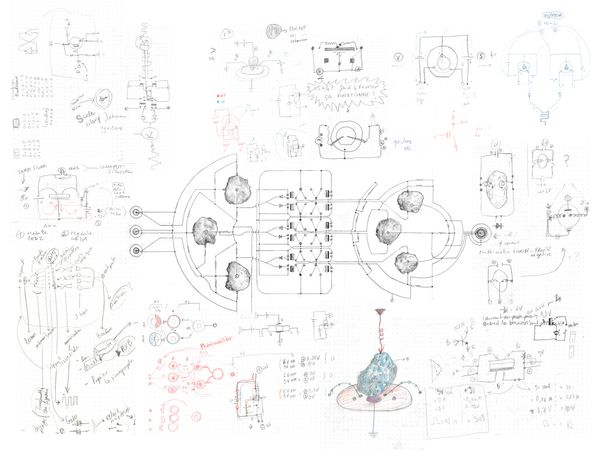
Si (1-bit computer): Signal as a medium for representing digital materialities
Focus #24 - Digital Materialities
ISSUE - Journal of art & design HEAD, Genève - Article - Publication
[2024]
KERBRAT, Raphaëlle. Si (1-bit computer): Signal as a medium for representing digital materialities. Geneva: ISSUE – Journal of Art & Design HEAD, may 2024.
"The Si (1-bit computer) project, created by Raphaëlle Kerbrat at the Paris École des Arts Décoratifs as part of her PhD thesis entitled, ‘Le poids des données, paradoxes matériels et sensibles du numérique’ (‘The weight of data, material and sensitive paradoxes of digital technology’), offers to make the physical imprint of a computational process discernible. Si (1-bit computer) is based on the physical decomposition of a binary system and draws on the manipulation of silicon, a semiconductor material used to make transistors, which are at the core of digital electronics. Si (1-bit computer) operates by enlarging physical and temporal scales, stretching a logical operation over several seconds and amplifying the initial size of the components. Matter is a central element in this project, which reveals the workings of our digital devices in a way that is at once archaic and poetic."

Machin.e.s
Introduction to electronics for first-year students
École des Arts Décoratifs - Teaching
[2024]
The Machin.e.s workshop is an introduction to electronics for first-year students at the École des Arts Décoratifs.
Students are invited to manipulate and build electronic objects, graphics and sound, with entirely hardware-based programming (based on NE555s), to learn how to read and write a circuit, programming logic and how the various components work.
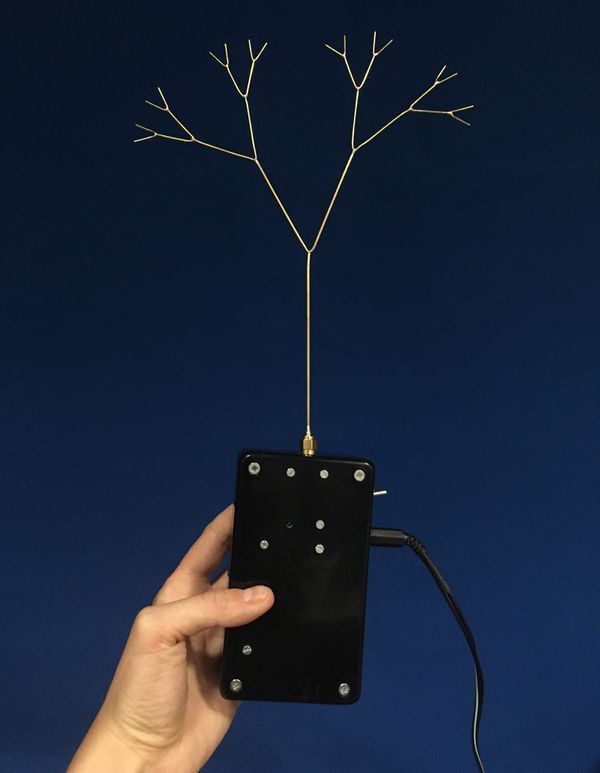
Useful fictions
Prendre Racine
Espace Mendès France, Poitiers - Workshop - Summer school
[2021]
LAB 4 | Immaterial landscapes Encadrants : Raphaëlle Kerbrat (EnsadLab PhD & artist) and Hervé Pérard (SIANA)
Reconnect with a sensitive experience of digital materialities, by exploring forms of data representation that embody the physical imprint of digital technology, in order to raise awareness of its environmental impact.
"Useful Fictions" is a arts-design-science summer workshop dedicated to constructing new ecological narratives: via workshops, conferences and a final exhibition, the aim is to implement and practice contemporary questioning of our living and technological environments.
Initiated by the Chaire arts & sciences in 2019 (in partnership with UC Davis1), this biennial summer workshop takes place this year in Poitiers, from July 4 to 11, 2021, under the title "Prendre racine" - Useful Fictions 2.
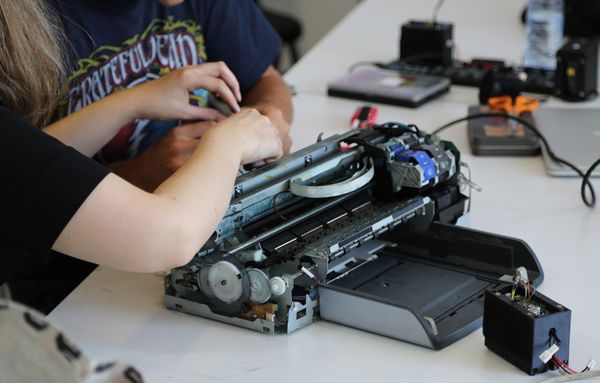
Modules de Recherche Création
MRC - Behavioral Object
École des Arts Décoratifs - Teaching
[2018-2021]
The MRC Behavioral Objects is an introduction to robotics designed for third-year students at the École des Arts Décoratifs.
In this Research and Creation Module, we propose that students explore the notion of "behavioral objects", both in its historical and theoretical roots, and through practice in the fields of art and design. Students will use a prototyping tool - the MisB KIT, a modular robotics kit we've developed to create and experiment with behavioral objects. The use of this kit will enable students to familiarize themselves with robotics around notions of interaction and collective expressiveness, while embedding this reflection within their own creative process.
Team: Raphaëlle Kerbrat, Olivain Porry, Filipe Pais.
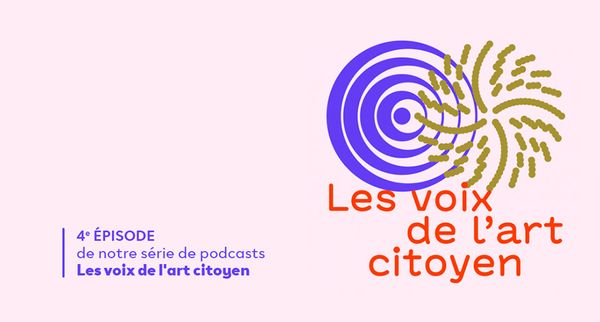
Podcast Les voix de l’art citoyen
Arts et sciences (4/11): rendre visible l’empreinte du numérique.
Fondation Daniel et Nina Carasso - Interview - Podcast
[2022]
A podcast from the Daniel and Nina Carasso Foundation, produced by wave.audio.
Executive producer: Isabelle Duriez.
This episode is written and presented by Léa Minod and directed by Guillaume Girault.
Episode 4 Arts and sciences (4/11): making the digital imprint visible.
"How can we poetically express the waves - Wi-Fi, 4G, 5G - that flow through us? And, more broadly, what can science contribute to art? Raphaëlle Kerbrat, artist and doctoral student at ENSADLAB, the research laboratory of the Ecole Nationale Supérieure des Arts Décoratifs, has made digital art her creative and research field. As part of her thesis, she is taking part in the Reflective Interaction program, directed by artist-teacher-researcher Samuel Bianchini and supported by the Daniel and Nina Carasso Foundation's arts and sciences chair. She takes us through the impalpable traces of the digital world."
Interview with Raphaëlle Kerbrat, visual artist and researcher, and Hugo Scurto, postdoctoral researcher at EUR ArTeC (Université Paris 8 / EnsadLab). Thanks to Christophe Pornay, ENSADLAB stage manager, Rémi Sagot-Duvauroux, Julie Sauret.
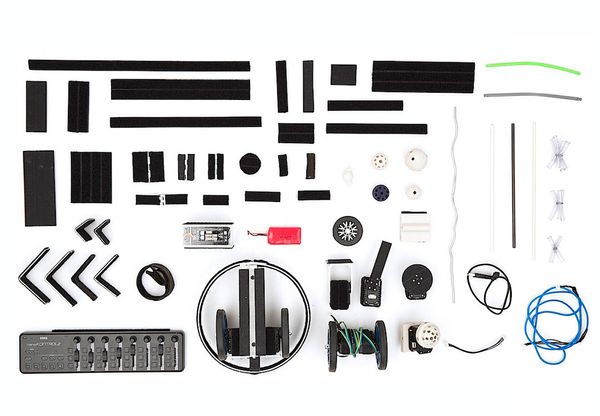
La Fabrique
Kids' workshop
Centre Pompidou, Paris - Ateliers enfants
[2019]
How can we create objects inspired by the living world that, through their movement, give the impression of being alive and even of behaving? In connection with the exhibition "La Fabrique du vivant" (Mutations/Créations 3) and with EnsadLab, the research laboratory of the École Nationale Supérieure des Arts Décoratifs, La Fabrique invests the field of the living by proposing to explore, through practice, the notion of "behavior", following a bioinspired approach and using the MisB KIT, a modular robotics kit developed by Ensadlab's Reflective Interaction group. Whether it's good, bad or strange behavior, the budding researchers, scientists, artists or designers of tomorrow will have plenty to experiment with, starting with the plant-inspired material Velcro, which is at the heart of this astonishing modular robotics kit for which children can also design and animate their own parts.
This series of workshops has been developed by EnsadLab's Reflective Interaction group, under the direction of Samuel Bianchini, with Filipe Pais, Didier Bouchon, Cécile Bucher, Brice Ammar-Khodja, Raphaëlle Kerbrat, Olivain Porry and Lucile Vareille, and with the support of the "arts and sciences" Chair at École polytechnique, École supérieure des Arts Décoratifs - PSL and the Daniel and Nina Carasso Foundation. The MisB KIT is currently being developed in collaboration with Luos Robotics and Suricats Consulting.
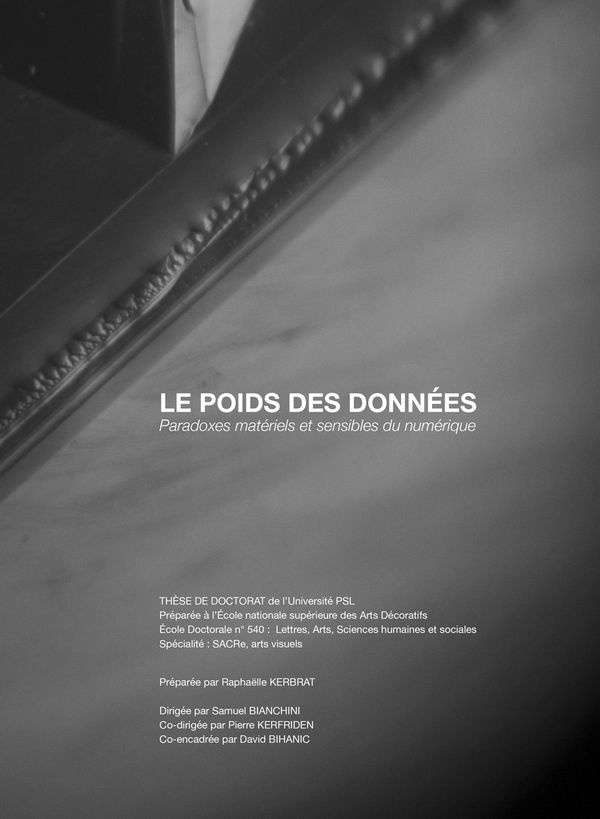
The weight of data: Paradoxes of materiality and sensitivity in the digital world
Exhibition and public defense at the Centre Pompidou on October 26, 2023
SACRe-PSL / École des Arts Décoratifs - PhD
[2020 - 2023]
This thesis was prepared within the framework of the doctoral program Sciences, Arts, Création, Recherche of the Paris Sciences et Lettres University (SACRe- PSL) at the École des Arts Décoratifs, under the supervision of Samuel Bianchini (École des Arts Décoratifs), Pierre Kerfriden (Mines Paris - PSL) and co-supervised by David Bihanic (Université Paris 1 Panthéon-Sorbonne).
Issue : Within the context of environmental crisis, which is now bringing into focus the paradoxes of an immaterial digital condition, what role can art play in the sensory awareness of digital materialities and the processes involved in processing and transmitting data flows?
Principal aims : This practice-based doctoral research aims to experiment with re-materialization processes that can embody the material imprint and energy traces of computational processes, to raise awareness of the physical reality of digital technology through artistic experiences.
Summary : The development of information technology, in a context of dematerialization of information, has instigated the digital into a world of immateriality. The miniaturization and complexity of the logical and physical layers of digital technologies have led, to some extent, to a noticeable lack of hardware on the user's side. Focusing on an algorithmic approach, essentially based on code and sign, digital processing of information has led to a distancing from its material and energetic components. Given the current environmental context, the energy consumption and material resources inherent in digital infrastructures today draw attention to the paradoxes of the immaterial condition of digital data.
Within the framework of an art research project, the challenges of representing digital materialities and computational processes are articulated through the practical application of artistic devices. This thesis aims to forge the notion of “dataphany” through experimentation with artifacts that reveal and implement the physical phenomena on which data processing is based. By clarifying this notion, we propose to reconnect with an awareness-raising experience of the physical imprint and energy traces of computational processes through visual and aesthetic operations.
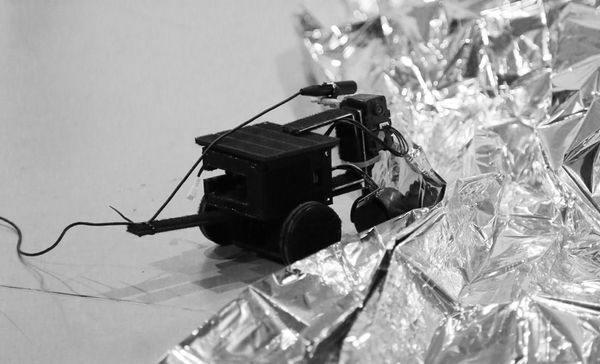
Fabrique des interfaces
Workshop MisBkit
Master ArTeC - Teaching
[2021-2024]
Intensive workshop with students from the Master ArTeC - Université Paris 8, as part of the Fabrique des interfaces class.
Coordination: Emanuele Quinz
The aim of the intensive workshop, which will involve building anti-machines, objects with behaviors, using the MisBkit modular robotics kit designed by the Reflective Interaction group at EnsadLAb (École nationale supérieure des Arts décoratifs), will be to encourage reflection through practice. In particular, it will test, through direct experimentation, the notion of behavior in an environment that is not only physical, but also defined as a social horizon, associating human and non-human.
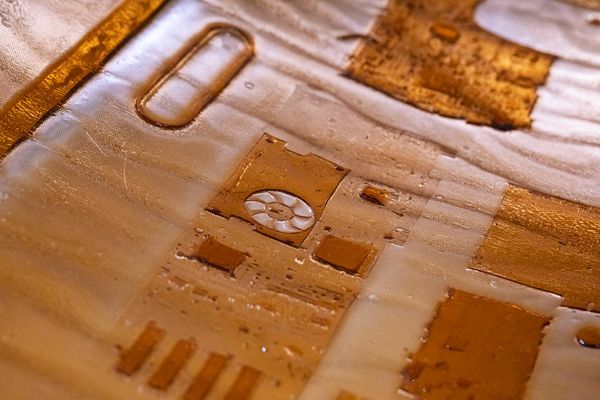
Fossilation : Nuturing Slow Expectations
Riverside Architectural Press / Living Architecture Systems - Article - Publication
[2022]
JARRY, Alice, BOUCHER, Marie-Pier, BIANCHINI, Samuel, GOMEZ, Géraldine, AMMAR-KHODJA, Brice, BACHMAYER, Alexandra, CHAUVIREY, Théo, CHEKHANOVICH, Maria, HALPENNY, Matthew, KERBRAT, Raphaëlle, MARDIROSSIAN, Vanessa, VANDAL, Philippe, WILKINS, Lee. Fossilation : Nuturing Slow Expectations. Toronto, Canada : Riverside Architectural Press, Living Architecture Systems, 2022.
"This research-creation folio presents the processual and technical development of a bio-inspired architectural installation that invests the ecological imprint of images. Originally presented during the 2021 ‘’Matières d’images’’ exhibition held at the Centre Pompidou in Paris (Hors Pistes Festival), Fossilation is a large suspended bioplastic membrane that repurposes food waste. The installation includes an electronic and electrical apparatus that harvests the residual energies of the museum to create fluctuating light patterns. Membranes are porous interfaces that participate in metabolic exchanges and enable and foreclose the mobility of information across systems. By reinvesting the relational operations of membranes, Fossilation makes us more attuned to the extractive origins of our contemporary forms of communication and develops new forms of cooperation between materiality, technology, humans, and ecological milieux. The publication is organized around seven key thematics that pertain to the making of Fossilation: The Ecology of Images, Fossils, Fossilation’s Ingredients, Bioplastics, Systems Architecture for Energy and Light, Nurturing Slow Expectations, and Membrane as Relay. Together these organizing forces render visible the resonances and contrasts between the conceptual, material, technological and methodological dimensions of the piece. With an emphasis on slow and low-tech methods, this folio examines how Fossilation might contribute to next-generation living architecture. The authors conclude the discussion by sharing the Fossilation collective’s onion pie recipe, the Pissaladière."
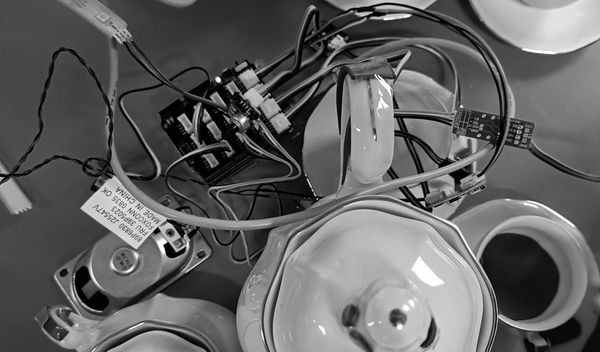
Électronique Sensible
PACTE - Siana, l'immaginaire des technologies
Lycée G. Brassens, Évry-Courcouronnes - Teaching
[2021]
Workshop for the 1ère STD2A class at lycée G. Brassens in Évry-Courcouronnes.
Students are invited to build electronic and interactive objects, to learn the basics of programming with Arduino. Through these objects, they explore the notions of conductivity, circuit and sequencing.
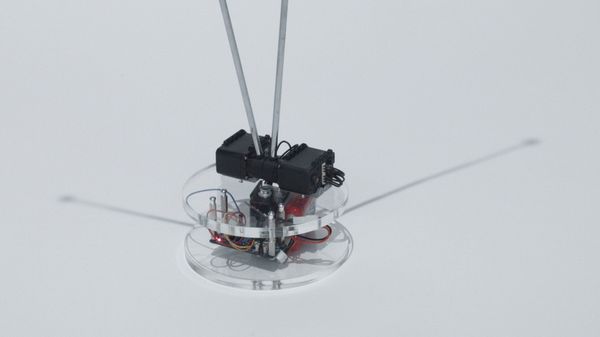
Dans la fabrique de l’intériorité
An exploration of the ways of being and expressive registers of behavioral objects
Collectif PsyPhINe - Article - Publication
[2021]
LEVILLAIN, Florent, BIANCHINI, Samuel, BOUCHON, Didier, BUCHER, Cécile, HOEGY, Aurélie, KERBRAT, Raphaëlle, LEPART, Selma, PAIS, Filipe, PORRY, Olivain. « Dans la fabrique de l’intériorité : une exploration des façons d’être et des registres expressifs des objets à comportements ». In : Collectif PsyPhINe (dir.). Que prêtons-nous aux machines ? Approches Interdiscplinaires des interactions homme-robot. Nancy : PUN- Éditions universitaires de Lorraine, 2021, p.215-237.
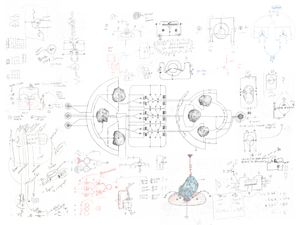
Si (1-bit computer): Signal as a medium for representing digital materialities
Focus #24 - Digital Materialities
ISSUE - Journal of art & design HEAD, Genève - Article - Publication
[2024]
KERBRAT, Raphaëlle. Si (1-bit computer): Signal as a medium for representing digital materialities. Geneva: ISSUE – Journal of Art & Design HEAD, may 2024.
"The Si (1-bit computer) project, created by Raphaëlle Kerbrat at the Paris École des Arts Décoratifs as part of her PhD thesis entitled, ‘Le poids des données, paradoxes matériels et sensibles du numérique’ (‘The weight of data, material and sensitive paradoxes of digital technology’), offers to make the physical imprint of a computational process discernible. Si (1-bit computer) is based on the physical decomposition of a binary system and draws on the manipulation of silicon, a semiconductor material used to make transistors, which are at the core of digital electronics. Si (1-bit computer) operates by enlarging physical and temporal scales, stretching a logical operation over several seconds and amplifying the initial size of the components. Matter is a central element in this project, which reveals the workings of our digital devices in a way that is at once archaic and poetic."
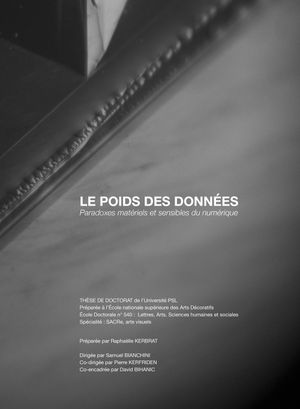
The weight of data: Paradoxes of materiality and sensitivity in the digital world
Exhibition and public defense at the Centre Pompidou on October 26, 2023
SACRe-PSL / École des Arts Décoratifs - PhD
[2020 - 2023]
This thesis was prepared within the framework of the doctoral program Sciences, Arts, Création, Recherche of the Paris Sciences et Lettres University (SACRe- PSL) at the École des Arts Décoratifs, under the supervision of Samuel Bianchini (École des Arts Décoratifs), Pierre Kerfriden (Mines Paris - PSL) and co-supervised by David Bihanic (Université Paris 1 Panthéon-Sorbonne).
Issue : Within the context of environmental crisis, which is now bringing into focus the paradoxes of an immaterial digital condition, what role can art play in the sensory awareness of digital materialities and the processes involved in processing and transmitting data flows?
Principal aims : This practice-based doctoral research aims to experiment with re-materialization processes that can embody the material imprint and energy traces of computational processes, to raise awareness of the physical reality of digital technology through artistic experiences.
Summary : The development of information technology, in a context of dematerialization of information, has instigated the digital into a world of immateriality. The miniaturization and complexity of the logical and physical layers of digital technologies have led, to some extent, to a noticeable lack of hardware on the user's side. Focusing on an algorithmic approach, essentially based on code and sign, digital processing of information has led to a distancing from its material and energetic components. Given the current environmental context, the energy consumption and material resources inherent in digital infrastructures today draw attention to the paradoxes of the immaterial condition of digital data.
Within the framework of an art research project, the challenges of representing digital materialities and computational processes are articulated through the practical application of artistic devices. This thesis aims to forge the notion of “dataphany” through experimentation with artifacts that reveal and implement the physical phenomena on which data processing is based. By clarifying this notion, we propose to reconnect with an awareness-raising experience of the physical imprint and energy traces of computational processes through visual and aesthetic operations.
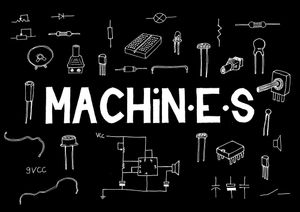
Machin.e.s
Introduction to electronics for first-year students
École des Arts Décoratifs - Teaching
[2024]
The Machin.e.s workshop is an introduction to electronics for first-year students at the École des Arts Décoratifs.
Students are invited to manipulate and build electronic objects, graphics and sound, with entirely hardware-based programming (based on NE555s), to learn how to read and write a circuit, programming logic and how the various components work.
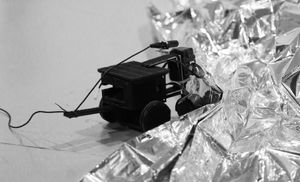
Fabrique des interfaces
Workshop MisBkit
Master ArTeC - Teaching
[2021-2024]
Intensive workshop with students from the Master ArTeC - Université Paris 8, as part of the Fabrique des interfaces class.
Coordination: Emanuele Quinz
The aim of the intensive workshop, which will involve building anti-machines, objects with behaviors, using the MisBkit modular robotics kit designed by the Reflective Interaction group at EnsadLAb (École nationale supérieure des Arts décoratifs), will be to encourage reflection through practice. In particular, it will test, through direct experimentation, the notion of behavior in an environment that is not only physical, but also defined as a social horizon, associating human and non-human.
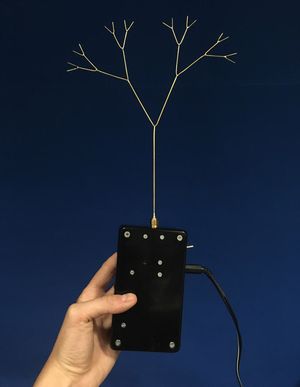
Useful fictions
Prendre Racine
Espace Mendès France, Poitiers - Workshop - Summer school
[2021]
LAB 4 | Immaterial landscapes Encadrants : Raphaëlle Kerbrat (EnsadLab PhD & artist) and Hervé Pérard (SIANA)
Reconnect with a sensitive experience of digital materialities, by exploring forms of data representation that embody the physical imprint of digital technology, in order to raise awareness of its environmental impact.
"Useful Fictions" is a arts-design-science summer workshop dedicated to constructing new ecological narratives: via workshops, conferences and a final exhibition, the aim is to implement and practice contemporary questioning of our living and technological environments.
Initiated by the Chaire arts & sciences in 2019 (in partnership with UC Davis1), this biennial summer workshop takes place this year in Poitiers, from July 4 to 11, 2021, under the title "Prendre racine" - Useful Fictions 2.

Fossilation : Nuturing Slow Expectations
Riverside Architectural Press / Living Architecture Systems - Article - Publication
[2022]
JARRY, Alice, BOUCHER, Marie-Pier, BIANCHINI, Samuel, GOMEZ, Géraldine, AMMAR-KHODJA, Brice, BACHMAYER, Alexandra, CHAUVIREY, Théo, CHEKHANOVICH, Maria, HALPENNY, Matthew, KERBRAT, Raphaëlle, MARDIROSSIAN, Vanessa, VANDAL, Philippe, WILKINS, Lee. Fossilation : Nuturing Slow Expectations. Toronto, Canada : Riverside Architectural Press, Living Architecture Systems, 2022.
"This research-creation folio presents the processual and technical development of a bio-inspired architectural installation that invests the ecological imprint of images. Originally presented during the 2021 ‘’Matières d’images’’ exhibition held at the Centre Pompidou in Paris (Hors Pistes Festival), Fossilation is a large suspended bioplastic membrane that repurposes food waste. The installation includes an electronic and electrical apparatus that harvests the residual energies of the museum to create fluctuating light patterns. Membranes are porous interfaces that participate in metabolic exchanges and enable and foreclose the mobility of information across systems. By reinvesting the relational operations of membranes, Fossilation makes us more attuned to the extractive origins of our contemporary forms of communication and develops new forms of cooperation between materiality, technology, humans, and ecological milieux. The publication is organized around seven key thematics that pertain to the making of Fossilation: The Ecology of Images, Fossils, Fossilation’s Ingredients, Bioplastics, Systems Architecture for Energy and Light, Nurturing Slow Expectations, and Membrane as Relay. Together these organizing forces render visible the resonances and contrasts between the conceptual, material, technological and methodological dimensions of the piece. With an emphasis on slow and low-tech methods, this folio examines how Fossilation might contribute to next-generation living architecture. The authors conclude the discussion by sharing the Fossilation collective’s onion pie recipe, the Pissaladière."
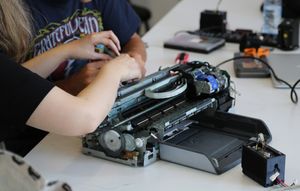
Modules de Recherche Création
MRC - Behavioral Object
École des Arts Décoratifs - Teaching
[2018-2021]
The MRC Behavioral Objects is an introduction to robotics designed for third-year students at the École des Arts Décoratifs.
In this Research and Creation Module, we propose that students explore the notion of "behavioral objects", both in its historical and theoretical roots, and through practice in the fields of art and design. Students will use a prototyping tool - the MisB KIT, a modular robotics kit we've developed to create and experiment with behavioral objects. The use of this kit will enable students to familiarize themselves with robotics around notions of interaction and collective expressiveness, while embedding this reflection within their own creative process.
Team: Raphaëlle Kerbrat, Olivain Porry, Filipe Pais.
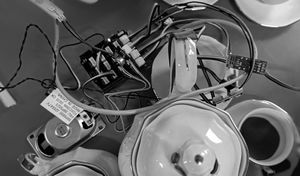
Électronique Sensible
PACTE - Siana, l'immaginaire des technologies
Lycée G. Brassens, Évry-Courcouronnes - Teaching
[2021]
Workshop for the 1ère STD2A class at lycée G. Brassens in Évry-Courcouronnes.
Students are invited to build electronic and interactive objects, to learn the basics of programming with Arduino. Through these objects, they explore the notions of conductivity, circuit and sequencing.
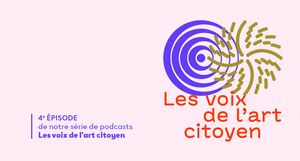
Podcast Les voix de l’art citoyen
Arts et sciences (4/11): rendre visible l’empreinte du numérique.
Fondation Daniel et Nina Carasso - Interview - Podcast
[2022]
A podcast from the Daniel and Nina Carasso Foundation, produced by wave.audio.
Executive producer: Isabelle Duriez.
This episode is written and presented by Léa Minod and directed by Guillaume Girault.
Episode 4 Arts and sciences (4/11): making the digital imprint visible.
"How can we poetically express the waves - Wi-Fi, 4G, 5G - that flow through us? And, more broadly, what can science contribute to art? Raphaëlle Kerbrat, artist and doctoral student at ENSADLAB, the research laboratory of the Ecole Nationale Supérieure des Arts Décoratifs, has made digital art her creative and research field. As part of her thesis, she is taking part in the Reflective Interaction program, directed by artist-teacher-researcher Samuel Bianchini and supported by the Daniel and Nina Carasso Foundation's arts and sciences chair. She takes us through the impalpable traces of the digital world."
Interview with Raphaëlle Kerbrat, visual artist and researcher, and Hugo Scurto, postdoctoral researcher at EUR ArTeC (Université Paris 8 / EnsadLab). Thanks to Christophe Pornay, ENSADLAB stage manager, Rémi Sagot-Duvauroux, Julie Sauret.

Dans la fabrique de l’intériorité
An exploration of the ways of being and expressive registers of behavioral objects
Collectif PsyPhINe - Article - Publication
[2021]
LEVILLAIN, Florent, BIANCHINI, Samuel, BOUCHON, Didier, BUCHER, Cécile, HOEGY, Aurélie, KERBRAT, Raphaëlle, LEPART, Selma, PAIS, Filipe, PORRY, Olivain. « Dans la fabrique de l’intériorité : une exploration des façons d’être et des registres expressifs des objets à comportements ». In : Collectif PsyPhINe (dir.). Que prêtons-nous aux machines ? Approches Interdiscplinaires des interactions homme-robot. Nancy : PUN- Éditions universitaires de Lorraine, 2021, p.215-237.
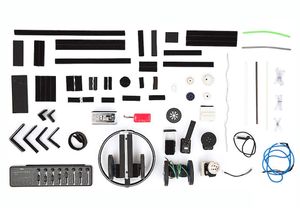
La Fabrique
Kids' workshop
Centre Pompidou, Paris - Ateliers enfants
[2019]
How can we create objects inspired by the living world that, through their movement, give the impression of being alive and even of behaving? In connection with the exhibition "La Fabrique du vivant" (Mutations/Créations 3) and with EnsadLab, the research laboratory of the École Nationale Supérieure des Arts Décoratifs, La Fabrique invests the field of the living by proposing to explore, through practice, the notion of "behavior", following a bioinspired approach and using the MisB KIT, a modular robotics kit developed by Ensadlab's Reflective Interaction group. Whether it's good, bad or strange behavior, the budding researchers, scientists, artists or designers of tomorrow will have plenty to experiment with, starting with the plant-inspired material Velcro, which is at the heart of this astonishing modular robotics kit for which children can also design and animate their own parts.
This series of workshops has been developed by EnsadLab's Reflective Interaction group, under the direction of Samuel Bianchini, with Filipe Pais, Didier Bouchon, Cécile Bucher, Brice Ammar-Khodja, Raphaëlle Kerbrat, Olivain Porry and Lucile Vareille, and with the support of the "arts and sciences" Chair at École polytechnique, École supérieure des Arts Décoratifs - PSL and the Daniel and Nina Carasso Foundation. The MisB KIT is currently being developed in collaboration with Luos Robotics and Suricats Consulting.